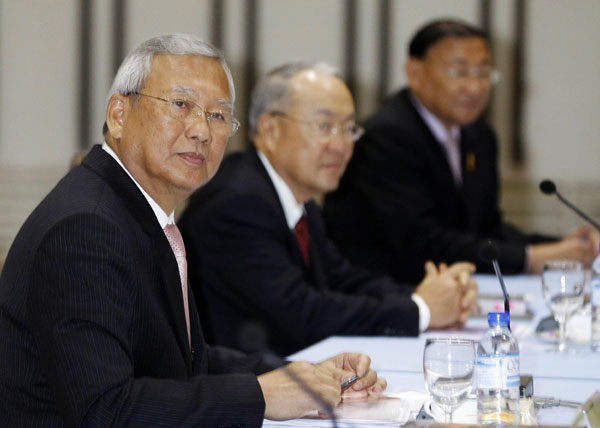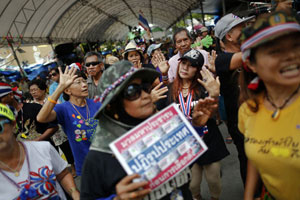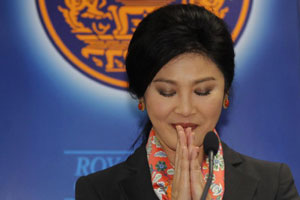July elections in Thailand 'unlikely' amid crisis
(Agencies) Updated: 2014-05-16 08:20
 |
|
Thailand's acting Prime Minister Niwatthamrong Boonsongphaisan (L) attends a meeting with members of Thailand's Election Commission at an air force base in Bangkok May 15, 2014. [Photo/Agencies] |
BANGKOK - Thailand's Election Commission said Thursday it is "highly unlikely" that the country will be able to hold July elections due to political unrest that has disrupted preparations. The turmoil was highlighted by protesters who forced the acting prime minister to flee a key poll-planning meeting and overnight violence that left three dead.
The attack on a protest site, in which at least 22 others were injured, prompted a televised announcement by the army chief, Gen. Prayuth Chan-ocha, that the military might have to "use force" if violence continues. The comment repeated earlier warnings from Prayuth since the political crisis escalated six months ago.
Acting Prime Minister Niwattumrong Boonsongpaisan was meeting Thursday with the Election Commission at an air force academy outside Bangkok to discuss whether the controversial polls could be held July 20 or would have to be delayed due to the political conflict. He had chosen the location for security reasons to avoid protesters in the capital who are opposed to the election and are calling for an unelected, appointed prime minister.
About 100 protesters who had driven in motorcades from central Bangkok entered the compound through a side entrance, blowing whistles and waving Thai flags. Riot police stationed outside apparently allowed them to enter, followed by protest leader Suthep Thaugsuban.
Niwattumrong and several Cabinet ministers at the meeting were notified by security officers that protesters were approaching and hastily ended the meeting, got into their cars and were driven away.
"The government side agreed that we should leave for our own safety," said Lt. Gen. Paradorn Pattanathabutr, a senior government official who attended the meeting. "The protesters wanted to get in, so we had to leave in our vehicles immediately."
He said the government has suggested that future meetings be held by teleconference.
If the July date doesn't work out, it could be delayed by a few weeks or longer, said the commission's secretary-general, Puchong Nutrawong.
Thailand's long-running political crisis deepened last week when the Constitutional Court removed Prime Minister Yingluck Shinawatra for nepotism along with nine Cabinet members in a case that many viewed as politically motivated. Protesters say Yingluck's removal is not enough, though. She was simply replaced by Niwattumrong, who was a deputy premier from the ruling party.
Yingluck's party would almost certainly win another election because of its widespread support among the rural poor, and protesters are opposed to polls without political reforms implemented first. They want to set up an unelected "people's council" to implement still-undefined changes to completely remove Yingluck's family influence from politics.
Thailand's political crisis began in 2006, when Yingluck's brother, former Prime Minister Thaksin Shinawatra, was toppled by a military coup after being accused of corruption, abuse of power and disrespect for King Bhumibol Adulyadej.
Thaksin, a former telecommunications billionaire, remains highly popular among the poor in Thailand's north and northeast, and parties controlled by him have won every national election since 2001. The anti-government protesters, aligned with the opposition Democrat Party and backed by the country's traditional elites, say they want to remove all traces of his political machine from politics.
 |
 |










